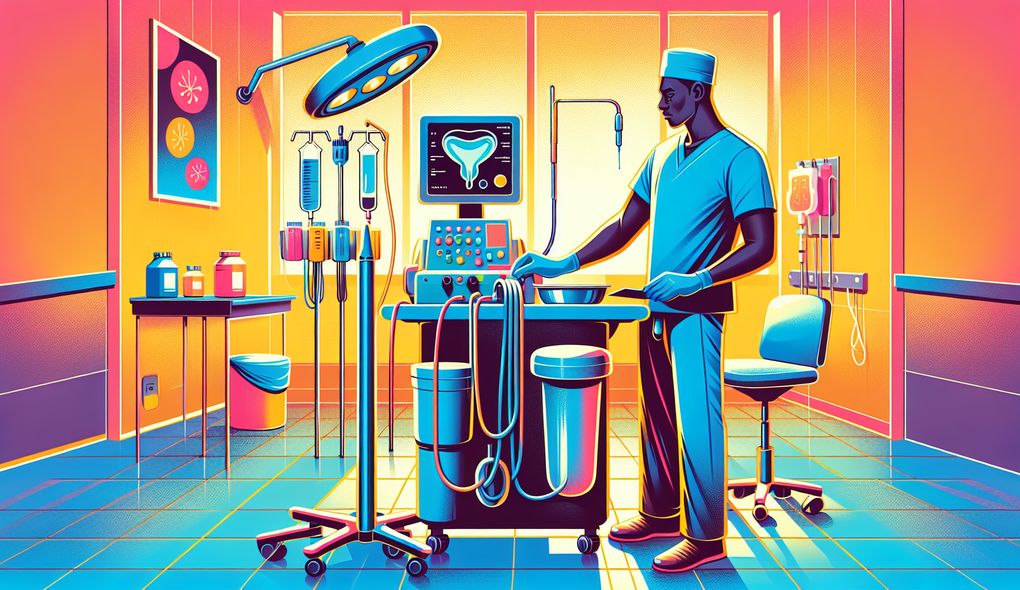How do you prioritize patient safety when assisting urological procedures and surgeries?
INTERMEDIATE LEVEL

Sample answer to the question:
When assisting urological procedures and surgeries, I prioritize patient safety by ensuring that all necessary equipment and supplies are readily available and in proper working condition. I also carefully review the patient's medical history and any relevant test results to identify any potential risks or complications. During the procedure or surgery, I closely monitor the patient's vital signs and response to anesthesia, and promptly address any abnormalities or concerns. Additionally, I follow strict aseptic techniques and infection control protocols to minimize the risk of surgical site infections. After the procedure or surgery, I provide thorough post-operative instructions to the patient and their family to promote a safe and successful recovery.
Here is a more solid answer:
When it comes to prioritizing patient safety during urological procedures and surgeries, my approach begins with thorough preparation. I carefully review the patient's medical history, including any allergies or previous adverse reactions to anesthesia or medications. This helps me anticipate potential risks and take proactive measures to mitigate them. During the procedure, I closely monitor the patient's vital signs, such as blood pressure, heart rate, and oxygen saturation, to ensure that they remain stable. I am vigilant in recognizing any signs of distress or complications and take immediate action to address them. I prioritize effective communication with the surgical team, ensuring that everyone is on the same page regarding the patient's condition and any specific requirements. This collaborative approach facilitates prompt decision-making and ensures the best possible care for the patient. After the procedure or surgery, I provide comprehensive post-operative instructions to the patient and their family, emphasizing the importance of proper wound care, medication management, and follow-up appointments. By prioritizing patient safety throughout the entire process, I strive to create an environment that promotes optimal outcomes and positive patient experiences.
Why is this a more solid answer?
The solid answer expands on the basic answer by providing specific details and examples of how the candidate prioritizes patient safety. It demonstrates their expertise in reviewing medical histories, monitoring vital signs, and effectively communicating with the surgical team. However, it could further improve by providing more specific examples of proactive measures taken to mitigate risks and address complications during urological procedures and surgeries.
An example of a exceptional answer:
Ensuring patient safety is paramount when assisting urological procedures and surgeries. To achieve this, I employ a systematic approach that incorporates several key elements. Firstly, I collaborate closely with the surgical team to develop a comprehensive plan that addresses the unique needs and challenges of each patient. This includes pre-operative assessments, consultations with anesthesiologists, and discussions with the patient to address any concerns or questions. Secondly, I adhere strictly to evidence-based practices and guidelines to minimize the risk of infections. This includes meticulous hand hygiene, proper sterilization of equipment, and adherence to aseptic techniques throughout the procedure. Thirdly, I am proactive in anticipating potential complications and have the necessary interventions and emergency equipment readily available. This includes having resuscitation equipment accessible, ensuring adequate blood supply, and preparing for potential allergic reactions or adverse events. Additionally, I prioritize ongoing education and professional development to stay updated on the latest advancements and best practices in urology. By continuously expanding my knowledge, I can deliver high-quality care and ensure patient safety. Lastly, I believe in fostering a culture of open communication and collaboration within the healthcare team. This allows for the exchange of information, ideas, and concerns, leading to improved patient outcomes. By prioritizing these elements, I consistently uphold patient safety and provide exceptional care throughout urological procedures and surgeries.
Why is this an exceptional answer?
The exceptional answer expands on the solid answer by providing a comprehensive and detailed approach to prioritizing patient safety during urological procedures and surgeries. It covers critical areas such as collaboration with the surgical team, adherence to evidence-based practices, proactive anticipation of complications, ongoing education and professional development, and fostering open communication within the healthcare team. It showcases the candidate's commitment to providing exceptional care and continuously improving patient safety. However, it could further enhance the answer by including specific examples of how the candidate has implemented these elements in previous roles or situations.
How to prepare for this question:
- Familiarize yourself with the most common urological procedures and surgeries, as well as the associated risks and complications. This will enable you to demonstrate a solid understanding of the field during the interview.
- Highlight any previous experience you have in assisting urological procedures and surgeries, emphasizing your adherence to patient safety protocols and your ability to handle high-stress situations.
- Develop strong communication skills and emphasize your ability to effectively communicate with both patients and the multidisciplinary healthcare team. This will showcase your ability to prioritize patient safety through clear and concise communication.
- Stay updated with the latest advancements in urology nursing by attending relevant conferences, workshops, and continuing education courses. This will demonstrate your commitment to ongoing learning and professional development.
- Prepare examples from your past experiences where you prioritized patient safety during urological procedures and surgeries. Highlight specific actions you took, challenges you faced, and the outcomes achieved.
- Practice situational and behavioral interview questions related to patient safety, urological procedures, and working in a multidisciplinary team. This will help you articulate your thoughts and experiences effectively during the interview.
What are interviewers evaluating with this question?
- Patient Safety
- Clinical Skills
- Communication Skills
- Ability to Work in a Team
- Knowledge of Urological Procedures
- Stress Management

